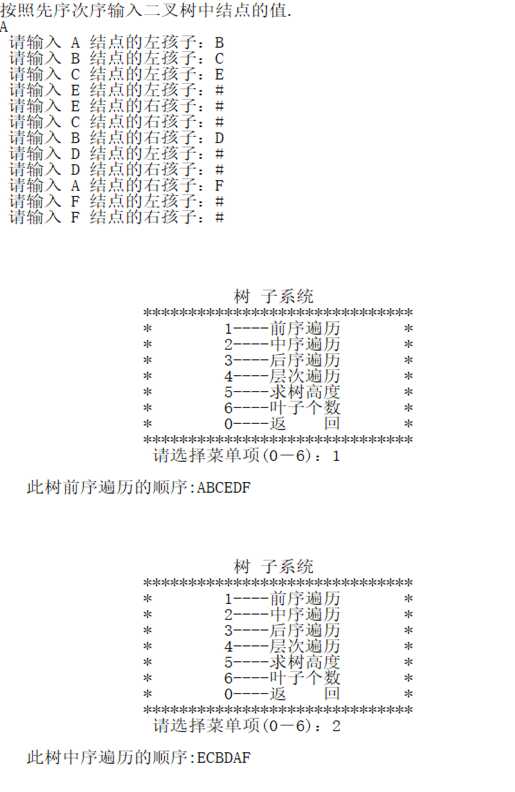课设4---二叉树的操作
Posted zongyao
tags:
篇首语:本文由小常识网(cha138.com)小编为大家整理,主要介绍了课设4---二叉树的操作相关的知识,希望对你有一定的参考价值。
二叉树
建立二叉树,先序、中序、后序、层次的遍历此二叉树,并求叶子结点个数、树的高度( 用递归或非递归的方法都可以)。
1 #include <stdio.h> 2 #include <stdlib.h> 3 #include<conio.h> 4 #define ERROR 0 5 #define OK 1 6 typedef char TElemType; 7 typedef int Status; 8 9 //二叉树的二叉链表存储表示 10 typedef struct BiTNode 11 { 12 TElemType data; 13 struct BiTNode *lchild, *rchild; 14 }BiTNode, *BiTree; 15 16 //定义链式队列结点 17 typedef struct QNode 18 { 19 BiTree Queuedata; 20 struct QNode * next; 21 }QNode,* QueuePtr; 22 //定义链式队列 23 typedef struct 24 { 25 QueuePtr front; 26 QueuePtr rear; 27 }LinkQueue; 28 29 //按照先序次序构造二叉树 30 Status CreatBiTree(BiTree &T) 31 {char ch; 32 scanf("%c",&ch);getchar(); 33 if(ch==‘#‘) T=NULL; 34 35 else 36 { 37 T=(BiTNode*)malloc(sizeof(BiTNode)); 38 T->data=ch; 39 printf(" 请输入 %c 结点的左孩子:",T->data); 40 CreatBiTree(T->lchild); 41 printf(" 请输入 %c 结点的右孩子:",T->data); 42 CreatBiTree(T->rchild); 43 } 44 return OK; 45 } 46 47 //递归先序遍历二叉树 48 Status PreOrder ( BiTree T ) 49 { 50 if ( T!=NULL) 51 { 52 printf("%c",T->data); 53 PreOrder ( T->lchild ); 54 PreOrder ( T->rchild ); 55 } 56 return OK; 57 } 58 59 //递归中序遍历二叉树 60 Status InOrder ( BiTree T ) 61 { 62 if ( T!=NULL) 63 { 64 InOrder ( T->lchild ); 65 printf("%c",T->data); 66 InOrder ( T->rchild ); 67 } 68 return OK; 69 } 70 71 //递归后序遍历二叉树 72 Status LastOrder ( BiTree T ) 73 { 74 if (T!=NULL) 75 { 76 LastOrder( T->lchild ); 77 LastOrder( T->rchild ); 78 printf("%c",T->data); 79 } 80 return OK; 81 } 82 //初始化一个带头结点的队列 83 Status InitQueue(LinkQueue &Q) 84 { 85 Q.front=(QNode*)malloc(sizeof(QNode)); 86 if (!Q.front) 87 return ERROR; 88 Q.rear=Q.front; 89 Q.front->next=NULL; 90 return OK; 91 } 92 93 //入队列 94 Status EnQueue(LinkQueue &Q,BiTree e) 95 { 96 QueuePtr s=(QueuePtr)malloc(sizeof(QNode)); 97 if (!s) 98 return ERROR; 99 s->Queuedata=e; 100 s->next=NULL; 101 Q.rear->next=s; 102 Q.rear=s; 103 return OK; 104 105 } 106 //出队 107 int DelQueue(LinkQueue &Q, BiTree &e) 108 { 109 char data1; 110 QueuePtr s; 111 s=Q.front->next; 112 e=s->Queuedata; 113 data1=e->data; 114 Q.front->next=s->next; 115 if(Q.rear==s) 116 Q.rear=Q.front; 117 free(s); 118 119 return OK; 120 } 121 //队列的判断空操作 122 Status QueueEmpty(LinkQueue Q) 123 { 124 125 if (Q.front->next==NULL) 126 return OK; 127 else return ERROR; 128 129 } 130 //按层次遍历 131 Status LevelBiTree(BiTree T) 132 { 133 LinkQueue Q; 134 135 InitQueue(Q); 136 BiTree p = T; 137 if (T == NULL) return ERROR; 138 139 EnQueue(Q,p); 140 141 while (!QueueEmpty(Q)) 142 { DelQueue(Q, p); 143 printf("%C",p->data); 144 145 if (p->lchild) 146 EnQueue(Q, p->lchild); 147 if (p->rchild) 148 EnQueue(Q, p->rchild); 149 } 150 return OK; 151 } 152 153 //树的深度 154 Status DepthTree(BiTree T){ 155 int llength=0,rlength=0; 156 if(T==NULL) return 0; 157 else{ 158 llength=DepthTree(T->lchild); 159 rlength=DepthTree(T->rchild); 160 return(llength>rlength)?(llength+1):(rlength+1); 161 } 162 } 163 164 //叶子节点的个数 165 Status Leafnumber(BiTree T){ 166 int rl=0,rh=0; 167 if(T==NULL) 168 return 0; 169 else if (T->lchild==NULL&&T->rchild==NULL) return 1; 170 else 171 { 172 rl=Leafnumber(T->lchild); 173 rh=Leafnumber(T->rchild); 174 return(rl+rh); 175 } 176 } 177 int main() 178 { 179 BiTree T; 180 printf("按照先序次序输入二叉树中结点的值. "); 181 CreatBiTree(T); 182 int k; 183 do 184 { 185 printf(" "); 186 printf(" 树 子系统 "); 187 printf(" ****************************** "); 188 printf(" * 1----前序遍历 * "); 189 printf(" * 2----中序遍历 * "); 190 printf(" * 3----后序遍历 * "); 191 printf(" * 4----层次遍历 * "); 192 printf(" * 5----求树高度 * "); 193 printf(" * 6----叶子个数 * "); 194 printf(" * 0----返 回 * "); 195 printf(" ****************************** "); 196 printf(" 请选择菜单项(0-6):"); 197 scanf("%d",&k);getchar(); 198 199 if (k==1) 200 { 201 printf(" 此树前序遍历的顺序:"); 202 PreOrder(T); 203 printf(" "); 204 205 } 206 else if (k==2) 207 { printf(" 此树中序遍历的顺序:"); 208 InOrder(T);printf(" "); 209 210 } 211 else if (k==3) //查找线性表中元素值为x的位置 212 { 213 printf(" 此树后序遍历的顺序:"); 214 LastOrder(T);printf(" "); 215 216 } 217 else if (k==4) //输出链表 218 { 219 printf(" 此树层次遍历的顺序:"); 220 221 LevelBiTree(T);printf(" "); 222 } 223 else if (k==5) //输出链表 224 { 225 226 printf(" 此树的高度是:%d",DepthTree(T)); 227 } 228 else if (k==6) //输出链表 229 { 230 231 printf(" 此树叶子结点个数是:%d",Leafnumber(T)); 232 } 233 }while(k!=0);
部分运行结果:

以上是关于课设4---二叉树的操作的主要内容,如果未能解决你的问题,请参考以下文章